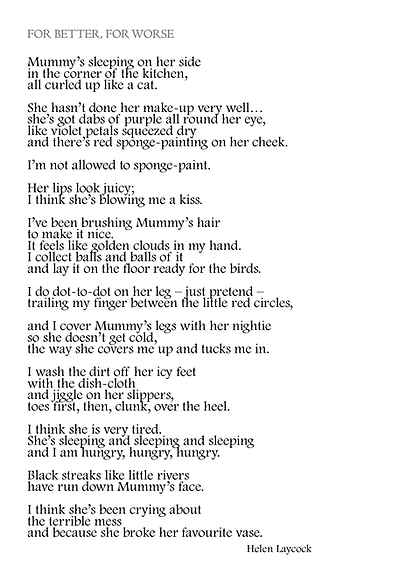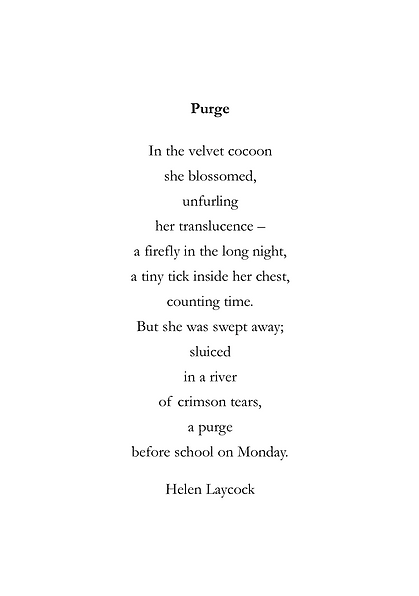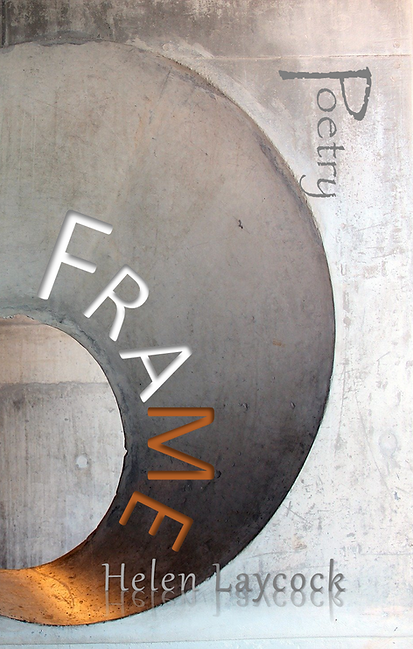Conjuring Marble into Cloud



From The East Ridge Review
Book of the Month, August 2022
American writer Katherine Anne Porter once stated that “human life itself may be almost pure chaos, but the work of the artist is to take these handfuls of confusion and disparate things, things that seem to be irreconcilable, and put them together in a frame to give some kind of shape and meaning” (my emphasis). Helen Laycock’s poetry collection Frame does exactly this by bringing together poems that explore both the brokenness and beauty of human experience.
With an accessible, personal, and lyrical voice, Laycock’s poems outline how one knows, processes, and confronts hardship, ambiguity, anxiety, along with a myriad of other realities. As such, the collection expresses a varied mood—some poems express nostalgia, while others are sharp, crushing, and even overwhelming. But the diverse perspectives are held as one with a consistent style of language, use of imagery, and focus on “the broken”. Frame is a superb volume of poetry and is worthy of wide engagement. I warmly recommend it.
Reviewed by Dr Andrew Williams
Pushcart nominee Helen Laycock’s ‘Frame’ is a stunning collection focused, in her own words, on “humanity on the periphery”. Those already familiar with Laycock’s work will be well versed with her seemingly limitless ability to conjure up new words or recound old ones with searing novel imagery.
This collection amply extends her golden run.
In ‘For Better, For Worse’ we witness from a child’s perspective, the aftermath of some awful domestic abuse. Mummy is sleeping, her eyes “like violet petals squeezed dry”.
‘Damaged’ is a vivid description of a peach being consumed or rather a father taking something soft and damaging it beyond repair. Papa “…cupped its weight, bounced it like a baby…” until “guts spilled” and “it cried sticky tears.”
‘(Anorexia)’ is so visceral and cutting to make it almost unreadable. The painful pathology is recounted from: “the ivory keys of her spine” and most devastatingly, to her “harped ribs”, all adding up to a body which is but “a dropped feather to be scooped by the wind.”
Laycock, like all the very best poets, pinpoints the specifics but finds the universal in these wretched places. many phrases simply refuse to be forgotten. Sadness, for instance, is “knitted into a wet jumper, pulling and dragging…”
In ‘Nightlife’ the women working the “iridescent pavements” have “zips that have done the relay so often, that they jag unyielding as they are yanked.” The poet’s descriptive power of this sort of minutiae is then poignantly reinforced by suggested glimpses of a buried inner life. We are simply told that “she enjoyed Great Expectations at school.”
Despite Laycock’s chosen subjects being pulled reluctantly into the light from some very dark corners, there is nothing peripheral or wasted here, as her words hit hard, page after page, and smart long after the read.
A major accomplishment by any measure.
A fresh, perceptive, lyrical collection of poetry that mixes traditional and free verse techniques
Helen Laycock here approaches what we all have in common but in our own unique way: how we encounter and respond to adversity, uncertainty, and hurt, own it through our resilience and endure. This is something we all know to a greater or lesser degree, but it takes a poet to give it a voice; a skill with language equivalent to what a musician can do with his or her instrument; something we can not only know but feel directly through art. The art of poetry relies on a use of language in a fresh and original way and Helen Laycock does just that; it's a pleasure to find such surprising turns of phrase that bring new appreciation to what we may have always known, as well as provide us with a new perspective. I highly recommend this intriguing and memorable collection to anyone who enjoys poetry or would like to begin to do so.
Just finished my first read of Frame (I expect I will be revisiting these poems soon again). I took my time with this poetry book the way one enjoys a luscious dessert. My favorites were "Invisible" which resonated with me. I gasped at the raw tragedies of "Nightlife" and "The Ferryman." Frame delivers on the promise of capturing "Humanity on The Periphery." I 100% recommend this read.
This is a collection of poems about the terrible things we humans endure, do to ourselves, and to each other.
It is unblinkingly honest, but only discomfiting until you recognise yourself.
Oh, the word choices and combinations are so striking, revealing the hidden. Repeated imagery and phrasing become leitmotifs that link the poems but also offer a vocabulary for ineffable emotions. Read together, the poems become a song to all us humans who are a little bit broken.
Easy to be absorbed by this book. Such despair, such beauty. Such reckoning of self with inner demons. A brilliant common thread, too, this idea of seeing ourselves as through a frame.
I Found Myself: A Broken Frame
'Unnamed' I embraced the orphaned and I understand.
'For Better, For Worse' Almost mirrors Misty's story. A choke away, from mirroring mine. Powerful and poignant.
The awakening in 'Anorexia' too many descriptions to name. Heartbreaking and beautifully portrayed.
'"The Sadness' is deeper than me." I have no words.
Ego defined, marvelously.
"The tip of the point of a pen is the size it should have stayed."
'Me, Myself, and I'
'Drink to the Future'
"A wise woman just pours more tea."
I like that.
'Invisible'
"I am a person
but I must hide
with all my colours trapped inside."
Magnificent!
'Bared'
"...she is not naked until she has unfolded herself"
My favorite line: "Worn-out wings of a broken sparrow."
'Woman'
Through gratitude and tears, my summation: Read. This. Book. It's a wonderful weave of poetry that I didn't want to put down. Helen Laycock's use of language and imagery is superb. Within the pages of this book I discovered framed fragility of the human spirit.
Vivid use of words
I bought Helen's book months ago and have been savouring her words slowly, one poem at a time. 'When it rains' is possibly my favourite, but then 'Anorexia' tugs me in another direction. Some of her poems make tough reading - no anodyne words here - and every phrase counts. A book to return to more than once.
Painting with Words
As the title implies, Frame, by Helen Laycock, holds the poet-author’s lyrical thoughts as portraits in a gallery - exquisite and varied in perspective and style, timeless in thematic exploration. This book of verse, punctuated with observations of master artisans from film to literature on the theme and the journey within.
I've long admired Helen Laycock's poetry for its vivid imagery and raw portrayal of the human condition. In 'Frame' we see her remarkable range across formal and free verse, covering a spectrum of relatable moments, events, and reckonings.
I'm enamoured with Laycock's treatment of the child/parent relationships within this collection. Her use of nursery rhyme forms and horror references in poems such as Life Library, Big Fat Hen, Nostalgia, act almost as a dissociative tool in covering multiple dimensions of an experience.
Tragic. Brutal. Honest. Hopeful. I loved this book.
This is poetry!
Forget Rupi & Atticus with their one-line appeal to the masses, this book is poetry. Metaphorically majestic works of art, poems that reach inside your soul and squeeze your heart. I can't say much more than this... Read it.
Helen Laycock is an amazing writer. Frame was a carefully, and wonderfully penned collection of poetry which was both poignant and interesting.



